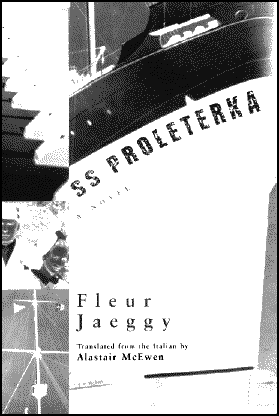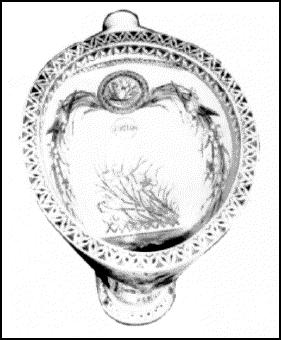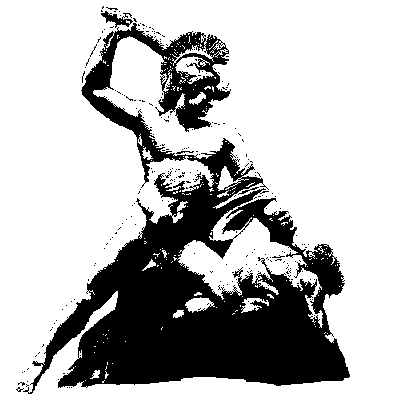Twelve Awful Books
Published During
The Year 2003
Listed below are parts of reviews of twelve books that the editors of RALPH found to be the very worst of 2003. Arranged in order of vanity, stupidity, and sheer awfulness.
§ § §Eternal
Treblinka
Our Treatment of Animals
And the Holocaust
Charles Patterson
(Lantern Books)
In our college classes in Aristotelian logic we were shown that a may equal b and b may equal c but c does not necessarily equal a. Patterson is saying:
a] Mistreating and murdering people = bad;
b] Mistreating and murdering animals = bad;
c] Mistreating and murdering people = Mistreating and murdering animals
When one equates Jews in the holocaust with pigs going to slaughter, something very screwy is going on. A people is not a pig. Au contraire, if I call someone a pig, it's insult of the highest order.
In
Shackleton's
Wake
Arved Fuchs
(Sheridan House)

Fuchs is what my Mum used to call a Sob Sister. He reeks not only of bilge, fog, cold, and icebergs, but self-pity. After he chose his bed-of-nails, this hot tea spilling out of the cup and over his gloves isn't very dramatic or brave. Hell, during those two years, Shackleton would have given his right arm for a cup of hot tea.The book reeks of a publicity machine cranking up. Sponsors turn up like toadstools after the rain: the cruise ship Hanseatic, the various boat-builders out of Denmark, Pro Freight boat haulers, and most unseemly of them all, one that rests on Fuchs' perfervid brow. From the photos, we thought for a moment there that his name was Jack Wolfskin --- that being the name emblazoned on his boating cap (and on the sail of the James Caird II). Turns out it's a sleeping bag manufacturer.
The
Crazed
Ha Jin
(Pantheon)
We suspect that The Crazed, like the author's previous Waiting, will drive the establishment reviewers crazed with delight. It probably has nothing to do with the story-line, and certainly not with the writer's style --- but, rather, the fact that it's a rare and strange item: a Chinese writer of the Tiananmen Square generation who can create a novel in English about the New China. Ha Jin thus gets high regard not for what he has accomplished but what he set out to do.Critics will thus be, yet again, confusing the art with the artist, and the fiction with the times.
Schubert's
Winterreise
A Winter Journey
In Poetry, Image,
And Song
John Harbison
Susan Youens
(University of Wisconsin Press)
What A Winter Journey misses is the wonder of Schubert. He could take exquisitely stupid poems and put exquisite music to them, music that works because it makes us forget all the acne-filled poetasting. The two dozen poems by Müller that Schubert selected for his song cycle tell of a lonely wanderer musing on his lost love, visiting the graveyard, revisiting the place of his love, thinking --- naturally --- on death. It takes a certain suspension of disbelief to get through this balderdash. To devote a whole book to Müller's verse is a grave mistake and performers know this well. I have yet to hear someone sing these songs in English without breaking down or breaking up. In German it's just bad poetry; in English it's a howl.
So Many Books,
So Little Time
A Year of
Passionate
Reading
Sara Nelson
(Putnam)
I think it is fair to describe So Many Books, So Little Time as a literary Tobacco Road. It's quick, and trashy, and has more than a hint of incest. It's obviously something that Nelson and her agent cooked up while having a power lunch at The Four Seasons. One can hear the gears clanking, the wheels turning, the pumps groaning: People who like to read books are going to be people who like to read books about people who read books, she opines. I love it! he purrs."Mark Reiter ... saw the possibilities in a book about reading almost before I did," she reports in her acknowledgments. The agent's aboard, how about a publisher? "My editor, Neil Nyren ... generously jumped at the chance to publish it." All her many friends at Glamour and The New York Observer think it's a corking good idea.
So she wades through a year's worth of books, slaps a manuscript together in a few weeks, and with her many connections in the Manhattan publishing stew pot, we know this one is going to go to the top of the heap.
Swagbelly
D. J. Levien
(Plume/Penguin)
Sometimes we long for the good old days, the days of D. H. Lawrence or John O'Hara, Henry Miller or Philip Wylie. The heroes had some grace, the ladies were often charming, if not sly. Sex turned up with panache if not pizzazz. It was usually pro bono, rarely pro forma. There was spirit and life: the author cared for his characters, for the readers, and probably for himself. Why, you wonder, does something as cheesy as this get sent out to the world? Fake mozzarella on a stale, seedy bun --- delivered with a big voila! from the publisher. You remember Penguin, don't you, back when they put out respectable books to pleasure to our minds, not our weenies?
Swagbelly is subtitled A Novel for Today's Gentleman. Dare we ask which gentlemen they have in mind?
S. S. Proleterka
Fleur Jaeggy
(New Directions)

This one has all the New York literary magpies atwitter. The New York Review of Books, the American Book Review, and Newsday have gone bonkers over S. S. Proleterka. A recent notice in the NYRB announced that, under the auspices of New York University, "Susan Sontag will introduce the author and read from the English translation" of S. S. Proleterka. God knows how she'll be able to carry it off without falling into the sleeping sickness just like one of her uncles.This one is La Nausée without art, "Death in Venice" without lust, "Last Year at Marienbad" without the still-shots. It is a short and self-indulgent mishmash that is sure to appeal to critics who wish they had been around when the Existentialists hit town, and --- having missed that --- are content to hop aboard this journey into nowheresville.
An American
Summer
Frank Deford
(Sourcebooks Landmark)

We have to wonder about the time and trouble the author spent researching this stinker. Kathryn had polio, is in an iron lung. Her lungs are so weak that she cannot breathe on her own. Yet the narrator tells us that she can make a variety of ear-splitting noises: she constantly yells instructions down to Christy from her second-floor apartment. Christy also tells us that She could whistle much better than those really good whistlers who put their two fingers in their mouths and let a blast go that way. I honestly believe still that Kathryn could out-whistle any man.
This from a woman who cannot breathe on her own.
American
Standard
John Blair
(Pittsburgh)

In my salad days, those who wrote about the south --- William Faulkner, Erskine Caldwell, Eudora Welty, Richard Wright, Truman Capote, James Agee --- offered up to the reader the most deprived, hopeless cases, battered by poverty, injustice, racism --- rednecks or crackers or blacks in the most desperate conditions of sweaty poverty. But in their writings there was always a small flower of nobility given to even the most piteous of them --- an edge of hope that could turn a Snopes into a character of wonder.
Not so in American Standard. All hope is blotted out with blood, lunatic suicides, and old people full of the "yellow smell of their age."
God knows why people would ever want to read this trash, and god knows why a respectable university press sees the need to spawn this morbid view of the universe of men. The motto of the first story is , Be careful, watch for alligators, stay away from men like me. The last: God knows what's in your heart. "American Standard" is the trade name you see on toilets. Figures.
Pacific High
Adventures in
The Coast Ranges
From Baja to Alaska
Tim Palmer
(Island Press)
Palmer's writing style is not unlike the large growths all along this extended range: wooden, very wooden. "The girthy trees at Potrero Island looked beautiful..." Girthy? Not in my Webster's. "I now thought of my upcoming months in California as a quercine tour..." Quercine? Ditto. This disquisition on a morning stroll in Julian, California:The sidewalks on that Sunday morning overflowed with three-generation families out for a drive; with middle-aged couples on bed-and-breakfast getaways, perhaps from the humdrum of mature marriages; and with white-haired husbands and wives who had grown to look alike in their body type, their gait, their wrinkle lines molded by a million joys and sorrows shared together. Even their midriffs bulged in tandem...
"A million joys and sorrows..." "Even their midriffs bulged in tandem..." This is filler stuff --- and doesn't belong in a serious travel document.
Media Violence
And Its
Effect
On Aggression
Assessing the
Scientific Evidence
Jonathan L.
Freedman
(University of Toronto)

Freedman, we are told, is Professor of Psychology at the University of Toronto. Are we talking about the same University of Toronto --- the one up there over the border somewhere? Or maybe there is another University of Toronto, in Upper Volta, perhaps, in a small town also called Toronto, not more than thirty kms. from Ouagadougou, with its own precious, small, and underfunded "University of Toronto." Where our good professor lives and teaches and comes up with such otherworldly statements as "I hope that neither organizations nor individuals will ever again say that the evidence for a causal effect of media violence is overwhelming or that the case is closed. Perhaps the people will even begin to accept the clear fact that the evidence does not support the notion that exposure to media violence causes aggression or desensitization to aggression."
Yvor Winters:
Selected Poems
Thom Gunn, Editor
(The Library of America)
Reading through the 200 or so poems here reminded us of the origin of the word "poet." The word comes from the Sanskrit cinoti. It means "he heaps up." And Winters is an example of the Neo-Miltonic class of heapery: Now praise Almena for unchanging pride!
Or
Theseus emerged. Ariadne awaited him...
Or
The minotaur is dead/Pasiphae the white will sin no more...
Or
If I ever pleased the muse/May she not one boon refuse.
Or
The earth for miles is massed with wet...
At this point, we confess to not being without sin. What with the name Yvor, we always thought that he was a she. Turns out it's "Arthur Yvor Winters." In his (or her) verse, it makes no difference. His name could have been Mudd. The notes tell us that Winters taught at Stanford University for almost thirty years, from 1937 to 1966. If you ever want an example of how a tenured professorship in a fancy-dan college can cook one's poetic goose, it's right here. In black and white.





